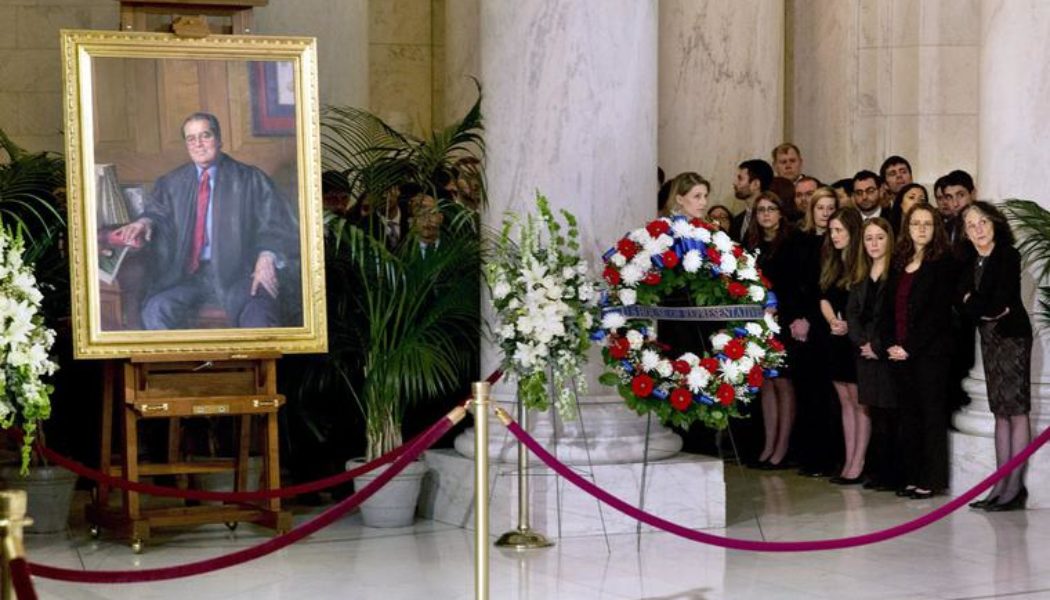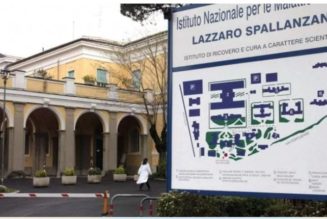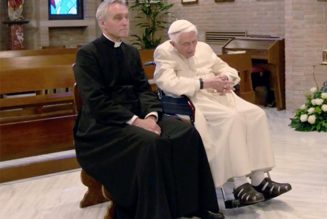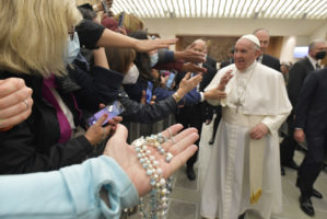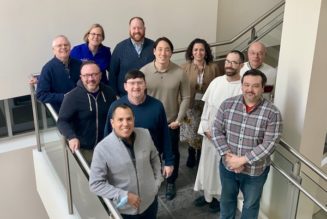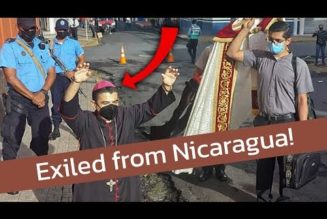
Justice Antonin Scalia’s writings lent authority and credibility to the pro-life movement, invigorating us in the good times and re-invigorating us in the bad times.
In the past weeks, as we Catholics have celebrated the overturn of Roe v. Wade, some of the discussion has turned to credit; that is: who should receive the credit for the overturn. But in this conversation, there has been a strange omission, so let us say it here. Though he passed away in 2016, much of the credit for overturning Roe belongs to Justice Antonin Scalia.
A devout Catholic and father of nine, Scalia was nominated by President Ronald Reagan to the Supreme Court in 1986. For the next 30 years, Scalia proved unwavering in his position that Roe v. Wade was flagrantly unconstitutional; he maintained, therefore, that Roe must be overturned.
In 1989’s Webster v. Reproductive Health Services decision, Scalia produced a powerful critique of Roe, even rebuking some of his fellow justices for refusing to overturn the unconstitutional nonsense that was Roe v. Wade. He wrote, “It thus appears that the mansion of constitutionalized abortion law, constructed overnight in Roe v. Wade, must be disassembled doorjamb by doorjamb, and never entirely brought down, no matter how wrong it may be.”
In the 1990 Hodgson v. Minnesota case regarding parental notification for minors seeking abortion, Scalia criticized the farce of judicial activism. Scalia wrote: “I continue to dissent from this enterprise of devising an Abortion Code, and from the illusion that we have authority to do so.”
In 1990’s Ohio v. Akron Center for Reproductive Health, Scalia reiterated his objection to the alleged Constitutional right to abortion: “I continue to believe … that the Constitution contains no right to abortion. It is not to be found in the longstanding traditions of our society, nor can it be logically deduced from the text of the Constitution …”
In 1992’s Planned Parenthood of Southeastern Pennsylvania v. Casey, Scalia again discussed the how and why to overturn Roe. He lamented that the Court so desperately clings to the notion of stare decisis (essentially meaning: sticking to case law) rather than bother to explain any justifiable rationale for Roe itself. He wrote, “The authors of the joint opinion, of course, do not squarely contend that Roe v. Wade was a correct application of ‘reasoned judgment’; merely that it must be followed, because of stare decisis. But in their exhaustive discussion of all the factors that go into the determination of when stare decisis should be observed and when disregarded, they never mention ‘how wrong was the decision on its face?’”
Instead of handcuffing itself to stare decisis, Scalia asserted the Court should concede something that even many pro-abortion progressives had long ago admitted: “Roe was plainly wrong.”
In 2000’s Stenberg v. Carhart, which essentially upheld the practice of partial-birth abortion, Scalia wrote a scathing dissent. He wrote: “The method of killing a human child — one cannot even accurately say an entirely unborn human child — proscribed by this statute is so horrible that the most clinical description of it evokes a shudder of revulsion. … The notion that the Constitution of the United States, designed, among other things, ‘to … secure the Blessings of Liberty to ourselves and our Posterity,’ prohibits the States from simply banning this visibly brutal means of eliminating our half-born posterity is quite simply absurd.”
Justice Scalia’s dissents sent a message to pro-life America that we were constitutionally correct, and that those who opposed us were plainly unconstitutional. Scalia’s writings lent authority and credibility to the pro-life movement. It invigorated us in the good times and re-invigorated us in the bad times.
Over the years, Scalia’s legal opinions, interviews and speeches attracted hundreds of conservatives to the legal field, as did his participation with The Federalist Society, an organization of conservative attorneys. Stu Nolan, the chairman of Human Life International and managing attorney of the Catholic law practice, LegalWorks Apostolate, recalls dozens of Federalist Society conventions, many of which featured Justice Scalia as a speaker, in which future Supreme Court nominees hosted discussions on many of Scalia’s favorite topics. “He was the inspiration of any law student who understood how Roe undermined the integrity of a Constitutional republic,” said Nolan. “If you’ll forgive the comparison,” Nolan continued, “Justice Scalia attracted vocations to the legal profession in much the same manner as St. John Paul the Great attracted vocations to the priesthood.”
One of those who was influenced mightily by Justice Scalia was Amy Coney Barrett, the Supreme Court Justice who sided with the majority to overturn Roe and Casey. Barrett clerked for Scalia years prior, and in her opening statement in her confirming hearings, she said:
I felt like I knew the justice before I ever met him, because I had read so many of his colorful, accessible opinions. More than the style of his writing, though, it was the content of Justice Scalia’s reasoning that shaped me. His judicial philosophy was straightforward: A judge must apply the law as written, not as the judge wishes it were. Sometimes that approach meant reaching results that he did not like. But as he put it in one of his best-known opinions, that is what it means to say we have a government of laws, not of men.
Justice Scalia taught me more than just law. He was devoted to his family, resolute in his beliefs, and fearless of criticism. And as I embarked on my own legal career, I resolved to maintain that same perspective.
Barrett’s comments highlight an irony. Scalia was viciously criticized by political progressives as the bogeyman of the Supreme Court. Why the criticism? Because he considered it the job of a judge to “apply the law as written.” The framers of the Constitution expected no less.
Justice Alito’s majority opinion in Dobbs, which overturned Roe v. Wade, echoes Scalia’s reasoning. Both the majority and the dissent reference Scalia numerous times in the Dobbs case. That is fitting.
To be sure, there are many heroes in the pro-life movement, some of whom have been fighting a 50-year war to rescue unborn babies. The virtues of charity, justice and gratitude necessitate their recognition. So let the story of Roe’soverturn be told. But please don’t tell that story without a note of thanks to Justice Antonin Scalia.
Join Our Telegram Group : Salvation & Prosperity
